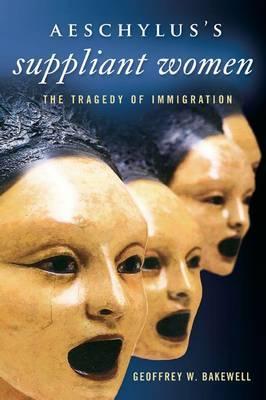Aeschylus's Suppliant Women

Aeschylus's Suppliant Women
Rigourously historical, Bakewell situates Suppliant Women in light of the unprecedented immigration that Athens experienced in the sixth and fifth centuries BCE. The flow of foreigners to Attika increased under the Pisistratids but became a flood following liberation, Cleisthenes, and the Persian Wars. As Athenians of the classical era became increasingly aware of their own collective identity, they sought to define themselves and exclude others. They created a formal legal status to designate the free noncitizens living among them, calling them metics and calling their status metoikia. When Aeschylus dramatised the mythical flight of the Danaids from Egypt in his play Suppliant Women, he did so in light of his own time and place. Throughout the play, directly and indirectly, he casts the newcomers as metics and their stay in Greece as metoikia.
Bakewell maps the manifold anxieties that metics created in classical Athens, showing that although citizens benefited from the many immigrants in their midst, they also feared the effects of immigration in political, sexual, and economic realms. Bakewell finds metoikia was a deeply flawed solution to the problem of large-scale immigration. Aeschylus's Argives accepted the Danaids as metics only under duress and as a temporary response to a crisis. Like the historical Athenians, they opted for metoikia because they lacked better alternatives.
PRP: 264.69 Lei
Acesta este Pretul Recomandat de Producator. Pretul de vanzare al produsului este afisat mai jos.
238.22Lei
238.22Lei
264.69 LeiIndisponibil
Descrierea produsului
Rigourously historical, Bakewell situates Suppliant Women in light of the unprecedented immigration that Athens experienced in the sixth and fifth centuries BCE. The flow of foreigners to Attika increased under the Pisistratids but became a flood following liberation, Cleisthenes, and the Persian Wars. As Athenians of the classical era became increasingly aware of their own collective identity, they sought to define themselves and exclude others. They created a formal legal status to designate the free noncitizens living among them, calling them metics and calling their status metoikia. When Aeschylus dramatised the mythical flight of the Danaids from Egypt in his play Suppliant Women, he did so in light of his own time and place. Throughout the play, directly and indirectly, he casts the newcomers as metics and their stay in Greece as metoikia.
Bakewell maps the manifold anxieties that metics created in classical Athens, showing that although citizens benefited from the many immigrants in their midst, they also feared the effects of immigration in political, sexual, and economic realms. Bakewell finds metoikia was a deeply flawed solution to the problem of large-scale immigration. Aeschylus's Argives accepted the Danaids as metics only under duress and as a temporary response to a crisis. Like the historical Athenians, they opted for metoikia because they lacked better alternatives.
Detaliile produsului








